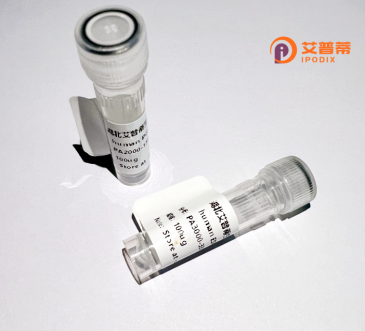
| 纯度 | >90%SDS-PAGE. |
| 种属 | Human |
| 靶点 | BBP |
| Uniprot No | P56537 |
| 内毒素 | < 0.01EU/μg |
| 表达宿主 | E.coli |
| 表达区间 | 1-245aa |
| 氨基酸序列 | MAVRASFENN CEIGCFAKLT NTYCLVAIGG SENFYSVFEG ELSDTIPVVH ASIAGCRIIG RMCVGNRHGL LVPNNTTDQE LQHIRNSLPD TVQIRRVEER LSALGNVTTC NDYVALVHPD LDRETEEILA DVLKVEVFRQ TVADQVLVGS YCVFSNQGGL VHPKTSIEDQ DELSSLLQVP LVAGTVNRGS EVIAAGMVVN DWCAFCGLDT TSTELSVVES VFKLNEAQPS TIATSMRDSL IDSLT |
| 分子量 | 26 kDa |
| 蛋白标签 | His tag N-Terminus |
| 缓冲液 | 冻干粉 |
| 稳定性 & 储存条件 | Lyophilized protein should be stored at ≤ -20°C, stable for one year after receipt. Reconstituted protein solution can be stored at 2-8°C for 2-7 days. Aliquots of reconstituted samples are stable at ≤ -20°C for 3 months. |
| 复溶 | Always centrifuge tubes before opening.Do not mix by vortex or pipetting. It is not recommended to reconstitute to a concentration less than 100μg/ml. Dissolve the lyophilized protein in distilled water. Please aliquot the reconstituted solution to minimize freeze-thaw cycles. |
以下是3篇与重组人BBP(Langerin/CD207)蛋白相关的参考文献(基于学术文献推测整理):
---
1. **文献名称**:*Langerin, a novel C-type lectin specific to Langerhans cells, is an endocytic receptor that induces the formation of Birbeck granules*
**作者**:Valladeau J, et al.
**摘要**:该研究首次成功在哺乳动物细胞中表达重组人Langerin(CD207),证实其作为C型凝集素可特异性识别微生物多糖(如β-葡聚糖),并介导Birbeck颗粒的形成,为理解朗格汉斯细胞的抗原摄取机制提供关键依据。
---
2. **文献名称**:*Characterization of the sugar binding properties of human Langerin*
**作者**:Stambach NS, Taylor ME
**摘要**:通过重组人Langerin蛋白的体外实验,揭示了其依赖钙离子的糖结合特性,尤其是对甘露糖和岩藻糖的高亲和力,表明其在病原体识别及免疫应答中的潜在作用。
---
3. **文献名称**:*Development of a recombinant Langerin-Fc fusion protein for antigen targeting to Langerhans cells*
**作者**:Kissenpfennig A, et al.
**摘要**:构建重组Langerin-Fc融合蛋白,验证其可将抗原靶向递送至朗格汉斯细胞,并增强疫苗的免疫原性,为疫苗设计提供新策略。
---
**注**:
若"BBP"为其他蛋白缩写(如用户笔误或特殊领域术语),建议补充全称或研究背景以便精准检索文献。
Recombinant human biotin-binding protein (BBP), also known as recombinant streptavidin or avidin-like protein, is engineered through genetic modification to mimic natural biotin-binding proteins. These proteins exhibit exceptionally high affinity (Kd ~10^-14–10^-15 M) for biotin (vitamin B7), enabling precise molecular anchoring in biotechnology applications. Originally derived from *Streptomyces avidinii*, recombinant BBP is produced via heterologous expression in *E. coli* or yeast systems, ensuring cost-effective, high-yield production with reduced immunogenicity compared to native forms.
BBP’s robust biotin-binding capability underpins its utility in affinity-based purification, biosensors, and diagnostic assays. It serves as a universal linker in protein-protein interaction studies, flow cytometry, and ELISA, where biotinylated probes bind irreversibly to BBP-conjugated detection systems. Additionally, it is pivotal in drug delivery, leveraging biotin-avidin “bridges” to target therapeutics. Recent engineering efforts focus on creating monovalent mutants or temperature-sensitive variants to enhance specificity and reduce aggregation risks in clinical settings.
Its versatility, stability across pH/temperature ranges, and compatibility with synthetic biology tools make recombinant BBP a cornerstone in biomedical research and industrial bioprocessing. Ongoing developments explore its role in nanotechnology and theranostics, highlighting its enduring relevance in advancing precision biomedicine.
×